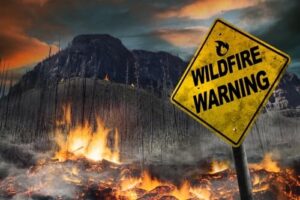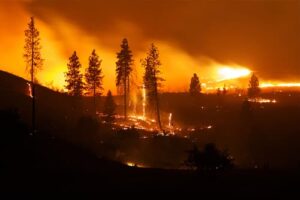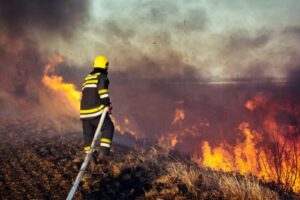Wildfires throughout the State of California can cause significant damage to both persons and property. If your property was severely damaged, and you’re struggling with the insurance company’s response, you should consider hiring a lawyer for your California wildfire claim as quickly as possible.
A lawyer is especially crucial if your claim involves complex legal issues or if the insurer denies your claim or offers an insufficient settlement. Additionally, if multiple parties are involved, such as government agencies or other property owners, a lawyer can help navigate these complexities.
Legal representation ensures that your rights are protected and can improve your chances of receiving fair compensation for damages. Consulting with a California wildfire lawyer early on can also provide guidance on gathering necessary evidence and meeting deadlines.
Table Of Content
When Can You File a Wildfire Claim in California?
 In California, you can file a wildfire insurance claim under several circumstances if a wildfire damages your property. Here’s when you may be eligible to pursue a claim:
In California, you can file a wildfire insurance claim under several circumstances if a wildfire damages your property. Here’s when you may be eligible to pursue a claim:
- Direct Property Damage – If your home or other property is damaged or destroyed in a wildfire, you can file a claim with your insurance company. This includes damage to structures, personal belongings, and landscaping. Insurance policies typically cover the cost of repairs or replacement up to the policy limits.
- Loss of Use – If a wildfire forces you to evacuate and you can’t live in your home, you may be eligible to recover compensation for additional living expenses. This includes costs such as temporary housing, meals, and other necessities while your property is being repaired or rebuilt. This type of coverage is often included under the “loss of use” or “additional living expenses” (ALE) provision of your policy.
- Smoke Damage – Even if your property isn’t directly burned in the wildfire, smoke and soot can cause significant damage. If smoke damages your home or belongings, you can file a claim for repairs and cleaning. This may include damage to walls, furniture, and air filtration systems.
- Business Interruption – If you own a business that is disrupted due to a wildfire, you can file a claim for business interruption losses. This covers lost income and additional expenses incurred due to the closure or damage resulting from the wildfire. You should ensure that your business insurance policy includes coverage for such interruptions.
- Wildfire-Related Expenses – Claims can also be filed for other wildfire-related expenses, such as the cost of debris removal or damage to property not covered under standard policies. This can include damage to outbuildings, fences, or other structures on your property.
- Denied Claims or Disputes – If your claim is denied or if there’s a dispute with your insurance company regarding the amount of compensation, you can take legal action. An attorney who handles wildfire claims can address these issues and ensure that you receive a fair settlement.
Filing a wildfire insurance claim involves gathering evidence of damage, documenting losses, and working with your insurance company to assess the claim. Understanding your policy and knowing when to seek legal help can ensure that you receive the compensation you’re entitled to recover.
What are the Qualities of a Good California Wildfire Claims Attorney?
When seeking a California wildfire claims attorney, certain qualities can make a significant difference in the success of your case. Here are some key traits to look for:
- Knowledge and Experience in Successfully Handling Wildfire Insurance Claims – A good attorney should have specific experience handling wildfire claims. Wildfire claims involve complex insurance policies and legal nuances, so knowledge in this area ensures the attorney understands the intricacies of wildfire-related damages and compensation.
- Strong Track Record – Look for an attorney with a proven track record of successful cases, particularly in wildfire claims or similar areas. A history of favorable outcomes demonstrates their ability to effectively navigate the claims process and secure fair settlements.
- In-Depth Knowledge of Insurance Law – Wildfire claims often involve disputes with insurance companies over coverage and compensation. An effective attorney should have a deep understanding of insurance law and be skilled in negotiating with insurers to ensure you receive the maximum compensation owed to you.
- Excellent Communication Skills – Clear communication is crucial throughout the legal process. A good attorney should be able to explain legal terms and processes in a way you can understand. They should also keep you updated on the progress of your case and be responsive to your questions and concerns.
- Compassion and Empathy – Dealing with wildfire damage can be emotionally challenging. An empathetic attorney understands the stress and disruption you’re experiencing and should approach your case with sensitivity and support.
- Strong Negotiation Skills – Much of the compensation process involves negotiating with insurance companies. A good attorney should be a skilled negotiator who is able to advocate on your behalf to achieve a fair settlement.
- Attention to Detail – Wildfire claims require meticulous documentation of damages and losses. An attorney who pays close attention to detail ensures that all evidence is properly gathered and presented, which is crucial for building a strong case.
- Positive Client Reviews – Check reviews and testimonials from previous clients. Positive feedback and recommendations can give you confidence in the attorney’s ability to handle your case effectively.
How Can an Experienced California Wildfire Claims Attorney Help with Your Case?
 An experienced California wildfire claims attorney can significantly affect the outcome of your case by providing strong legal knowledge and skills. Here’s how they can help:
An experienced California wildfire claims attorney can significantly affect the outcome of your case by providing strong legal knowledge and skills. Here’s how they can help:
- Navigating Complicated Insurance Policies – Wildfire insurance claims often involve complex policy language and coverage issues. An experienced attorney understands the intricacies of insurance policies and can interpret the terms and conditions to determine what is covered. They can also identify any potential gaps or exclusions in your policy and advise you on how to address them.
- Evaluating Your Claim – An attorney will assess the full extent of your damages, including property loss, smoke damage, and additional living expenses. They can help you understand the value of your claim by reviewing your documentation and ensuring that all damages are properly accounted for.
- Gathering and Presenting Evidence – Proving your case requires detailed evidence. An experienced attorney knows what evidence is necessary, such as photographs, repair estimates, and expert testimony. They can gather this evidence for you, present it effectively, and ensure that it supports your claim for maximum compensation.
- Handling Insurance Negotiations – Dealing with insurance companies can be challenging. An attorney can negotiate with insurers on your behalf to secure a fair settlement. They have the skills to counteract lowball offers and push for a settlement that accurately reflects the value of your damages.
- Managing Legal Deadlines – Wildfire claims involve various deadlines and procedural requirements. An experienced attorney is familiar with these deadlines and will ensure that all necessary paperwork is filed on time. This prevents delays and potential issues that may harm your case.
- Representing You in Disputes – If your claim is denied or if there are disputes with your insurance company, an attorney can represent you in legal proceedings. They can challenge denied claims, handle appeals, and take legal action if necessary to fight for your rights.
- Providing Strategic Advice – An experienced attorney can offer strategic advice on how to approach your case. They can guide you through each step of the claims process, including when to settle or pursue further legal action.
- Reducing Your Stress – Handling a wildfire claim can be overwhelming. By managing the legal aspects of your case, an attorney helps reduce your stress and allows you to focus on recovering and rebuilding your life.
Will I Need to Litigate a California Wildfire Claim?
 Whether you’ll need to litigate a California wildfire claim depends on several factors. Here’s how to determine if litigation may be necessary:
Whether you’ll need to litigate a California wildfire claim depends on several factors. Here’s how to determine if litigation may be necessary:
- Insurance Company Denial – If your insurance company denies your claim or refuses to offer you a fair settlement, litigation may become necessary. Insurance companies sometimes deny claims based on policy exclusions or undervalue damages. If negotiations fail to resolve these issues, filing a lawsuit may be the next step to seek the compensation you’re entitled to recover.
- Dispute Over Coverage – Disputes can arise over the interpretation of policy coverage. For example, if there’s disagreement about whether certain damages are covered or if the amount offered is insufficient, litigation may be required to clarify the terms and enforce your policy rights.
- Inadequate Settlement Offers – If your insurance company makes a low settlement offer that doesn’t adequately cover your damages or losses, litigation may be necessary to pursue a fair amount. An attorney can assess the offer and advise you on whether to accept it or proceed with legal action.
- Complex Cases – Some wildfire claims involve multiple parties or complex legal issues, such as damage resulting from multiple wildfires or disputes with multiple insurers. These complexities can make litigation more likely, as resolving these issues often require a court’s intervention.
- Failure to Reach a Settlement – Throughout the claims process, negotiations with the insurance company may not reach a satisfactory resolution. If settlement discussions are unsuccessful and no fair agreement is reached, filing a lawsuit can be necessary to resolve the claim.
- Evidence Disputes – If there’s a disagreement over the evidence presented, such as the extent of damage or the cause of loss, litigation may help to resolve these disputes. Your attorney can gather additional evidence, present it in court, and argue on your behalf.
- Legal Strategy – Sometimes, litigation is part of a broader legal strategy. Even if a case can potentially be settled, filing a lawsuit may be used to leverage better settlement terms from the insurance company.
An experienced wildfire claims attorney can determine the best course of action – and whether litigation is necessary to achieve a fair resolution in your case.
What Happens When Litigating a Wildfire Insurance Claim?
 After filing a complaint in the court system for a wildfire insurance claim in California, several steps follow in the legal process. This journey can be complicated, so it’s important to have experienced legal counsel in your corner fighting for your rights.
After filing a complaint in the court system for a wildfire insurance claim in California, several steps follow in the legal process. This journey can be complicated, so it’s important to have experienced legal counsel in your corner fighting for your rights.
- Once a complaint is filed, the court officially serves it on the defendant, which is usually the insurance company. This means that the insurance company is formally notified of the lawsuit and given a copy of the complaint. They have a specific amount of time – typically 30 days – in which to respond. The insurance company may respond by admitting to the claim, denying it, or filing a motion to dismiss the case entirely.
- Following this step, the case enters the discovery phase. Discovery is a critical stage where both parties gather evidence to support their positions. During this phase, each side can request documents, submit written questions called interrogatories, and conduct depositions. Depositions involve taking sworn statements from witnesses and experts who may provide crucial information about the wildfire and the insurance claim. This phase helps both sides understand the strengths and weaknesses of their cases and often sets the stage for settlement negotiations.
- After discovery, either party may file pre-trial motions. These are legal requests to the court to make certain decisions before the trial begins. For example, one party may file a motion for summary judgment, arguing that the evidence is so one-sided that the judge should decide the case without a trial.
- If the case does not settle during or after discovery, it proceeds to trial. During the trial, both sides present their evidence, call witnesses, and make arguments to either a judge or a jury. The trial can be a lengthy process, especially in complex cases involving significant wildfire damage and insurance disputes.
- Once the trial concludes, the judge or jury delivers a verdict. If the property owner wins, the court may order the insurance company to pay the claim and possibly additional damages. However, the case may not end there. The losing party sometimes has the right to appeal the decision, which can extend the legal process further.
A skilled attorney can aggressively represent you throughout every stage of the litigation process in pursuit of the compensation you deserve.
Speak with an Experienced California Wildfire Claim Attorney Right Away

Russell Reiner, California Wildfire Claim Attorney
If your property sustained damage in a recent California wildfire, it’s essential that you retain an experienced wildfire claims attorney as quickly as possible. Your attorney can promptly investigate the circumstances, determine your available legal options, and fight for the compensation you deserve – either through settlement or litigation.
